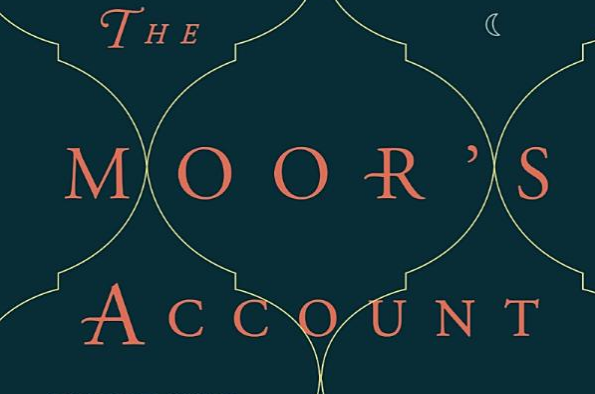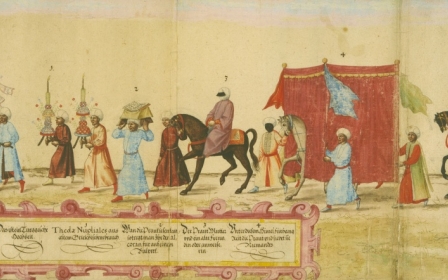Conquest from a slave’s perspective: Laila Lalami’s 'The Moor’s Account'

In the first pages of Laila Lalami’s new novel “The Moor’s Account,” Spanish colonisers disembark their ship, set foot for the first time in modern-day Florida, and make the following declaration to the indigenous people:
"If you do as we say, you will do well and we shall receive you in all love and charity. But if you refuse to comply, or maliciously delay in it, we inform you that we will make war against you in all manners that we can, and shall take your wives and children, and shall make slaves of them, and shall take away your goods, and shall do you all the mischief and damage that we can. And if this should happen, we protest that the deaths and losses will be your fault, and not that of their Highnesses, or of the cavaliers here present." (10)
As the novel’s protagonist, a Moroccan slave, listens to the speech being delivered, he wonders why the Castilians would choose such a time to make the proclamation - all of the Indian locals had fled the small fishing village just before the colonisers landed there. “How strange,” he remarks to the reader, “I know now that these conquerors, like many others before them, and no doubt like others after, gave speeches not to voice the truth, but to create it.
The above observation sets the stage for a ground-breaking work of historical fiction that provides readers with a raw, un-romanticised account of the Narváez expedition, a failed conquest made famous by the writings of one of its only four survivors, the Spanish explorer, Álvar Núñez Cabeza de Vaca. Lalami retells the story from the perspective of another of the survivors, Mustafa al-Zamori, known to the Castilians by his slave name Estabanico. Naturally, Mustafa’s position as a man who has experienced imperialism and slavery as a subject leads him to far different conclusions about the expedition than his European masters, who are acting out colonisation as agents.
In “The Moor’s Account,” Mustafa tells how the explorers separate from their ships and make their way from village to village in search of gold. They find very little, and instead, the expedition is plagued by hunger and disease, confused by poor navigation in an unmapped territory, and weakened by resistance from indigenous people. As the party of settlers, soldiers, and explorers shrinks and becomes separated from one another, the Europeans depend increasingly on various Indian tribes for survival, and at times find themselves stuck in a sort of indentured servitude, working and following strict orders in exchange for food and shelter.
Mustafa, a man who already speaks Arabic and Tamazight (the languages of his native Morocco,) Portuguese (the language of one of Morocco’s then-colonisers,) and Spanish (the language of his enslavers,) readily becomes able to communicate with the Indians, and serves as a translator and go-between for the Europeans. Here, his status is elevated and the slave - master relationship between him and his owner, Señor Dorantes, begins to fade away. It is only after making their way by chance to New Spain and reuniting with other Europeans that the old roles resurface. The three down-and-out Spaniards become famous, brave explorers overnight, and in recounting of their travels they are quick to minimise their dependence on and companionship with both Mustafa and the Indians.
Since he is not invited to contribute to the official documentation of the expedition, Mustafa takes up the pen and recounts the failed conquest from his perspective, intimating details that he says the other three survivors omitted when reporting their story to the Spanish authorities. His version does not leave out the savagery with which the Europeans treated the indigenous people in the early days of the expedition. Indeed, Mustafa includes details of Europeans torturing and raping Indian captives, cannibalism among starving shipwrecked colonisers, and the four survivors’ marriages to Indian women - information the other three are careful to leave out.
Additionally, while Cabeza de Vaca’s account only provides readers with a single sentence of background information on “Estabanico,” Mustafa spends several chapters telling the story of his upbringing and success as a merchant in Morocco, explaining how he ended up as a slave in Spain and eventually crossed the “Ocean of Fog and Darkness” to be a servant in a colonising mission in North America.
Written in the unique voice of a historical figure whose words would have been considered insignificant in the 1500s, “The Moor’s Account” gives a black Muslim slave, along with his Moroccan-American, author Lalami, permission to narrate the wrought history of European imperialism in the so-called New World.
Mustafa recognises that the Americas are not a blank canvas on which Europeans are free to create whatever new world they like. He instead refers to the place as the Land of the Indians, and presents a reality that cuts down the status of the Castilians from godlike (as they see themselves in their new environment before the expedition proves doomed) and elevates that of indigenous people to human.
Indeed, “The Moor’s Account” is a humanistic tale, and even Mustafa himself, though he admits he tells his story in order to be remembered, does not succumb to the same prideful pitfalls as the Europeans by claiming innocence. Just as greed brought the Spaniards to the Americas in search of gold and glory, Mustafa tells the reader, it was greed that allowed him, in years past as a merchant in Morocco, to sell slaves himself. “Give glory to God, who can alter the fates,” he repeats throughout the narrative.
In this way, Lalami refuses to whitewash the Nerváez expedition by presenting the colonisers as purely evil and indigenous people as purely innocent. In one chilling incident, Mustafa goes into detail about the brutal murder of his master’s brother by an Indian chief during their stay in one of the villages. In an earlier passage, as Mustafa hears the sound of women being raped by Europeans, he tells the reader his inaction makes him personally complicit in the crime.
Additionally, at several points throughout the novel, Lalami highlights the more subtle aspects of the ever-prevalent sexism of the age. In one striking exchange, Kwachi, an Indian friend of Mustafa and the other survivors, becomes frustrated when their poor hunting skills earn him flak from fellow hunters: “One day he said, Go pick roots with the women. ... It is easy work, he said.” Mustafa continues:
"Reader, it was not. The roots came from tall plants with thorny stems that grew in a marsh half a league from the village. [...] We had to burrow deep into the mud with our hands and when we managed to pull out the roots it was often at the expense of deep cuts on our hands and arms." (175)
As it unfolds, “The Moor’s Account” proves to be a feminist, in addition to a postcolonial text. In fact, some of the novel’s most inspiring characters are women. It is Mustafa’s mother who teaches him the power of telling a story, which emerges as one of the novel’s most central themes. Oyomasot, an Indian woman who becomes Mustafa’s wife, rebels against the customs of her tribe and excels as a skilled hunter and guide. In a flashback to Mustafa’s servitude in Spain, his fellow slave, Ramatullai, is subjected to frequent drunken rape by their master, and yet shows dignity and fierce determination to reunite with her daughter from whom she has been separated. Indeed, the reader is not spared horrifying scenes of the sexual abuse of women throughout the text - Lalami’s novel is a reminder that women often top the list of those systematically oppressed by “the disease of empire,” as Mustafa refers to it. (280)
But “The Moor’s Account” is far from exclusively dark. There is much to enjoy in the aesthetic sense, such as Mustafa’s pleasant voice, which is peppered with Arabic words, Moroccan sayings, and Islamic renderings of a Christian-dominated culture (e.g. references to “the prophet Jesus,” and “the Christian feast of the Nativity” for Christmas). Readers are also sure to appreciate the way Mustafa learns to take advantage of the Castilians’ perception of him, especially when he is asked late in the novel to assist in a new conquest in the Land of the Indians: “The elders tell us: Be a trickster, and you will survive.” (324)
Ultimately, however, readers are likely to be impacted most by the powerful message Mustafa sends about the value of telling a personal narrative, especially one that has previously been silenced. In one of the most memorable scenes of the novel, as he and Dorantes’ slave-master relationship dissolves, Mustafa has the opportunity to tell him about his life back in his homeland: “Reader, the joy of a story is in its telling,” Mustafa remarks. “Telling a story is like sowing a seed - you always hope to see it become a beautiful tree, with firm roots and branches that soar up in the sky. But it is a peculiar sowing, for you will never know whether your seed sprouts or dies.” (132)
Mustafa’s story certainly blooms. Those troubled by the realities of European colonisation of the Americas, in addition to the continued spreading of “the disease of empire” today, will not easily forget it.
(“The Moor’s Account” by Laila Lalami, Pantheon Books, 2014, 322 pages, ISBN 978-0-307-91166-7, $26.95)
New MEE newsletter: Jerusalem Dispatch
Sign up to get the latest insights and analysis on Israel-Palestine, alongside Turkey Unpacked and other MEE newsletters
Middle East Eye delivers independent and unrivalled coverage and analysis of the Middle East, North Africa and beyond. To learn more about republishing this content and the associated fees, please fill out this form. More about MEE can be found here.




